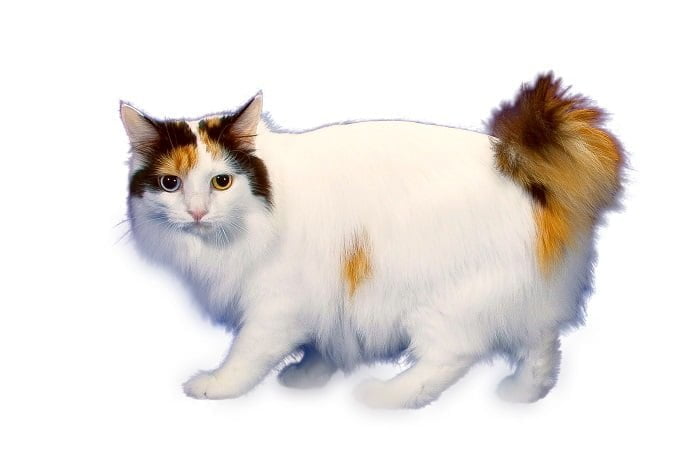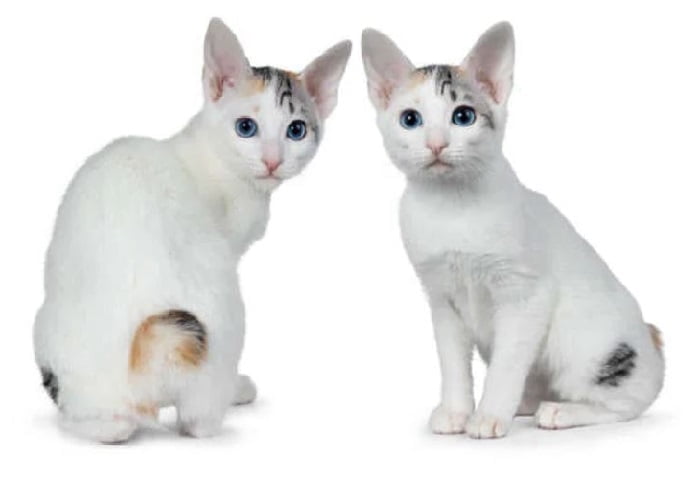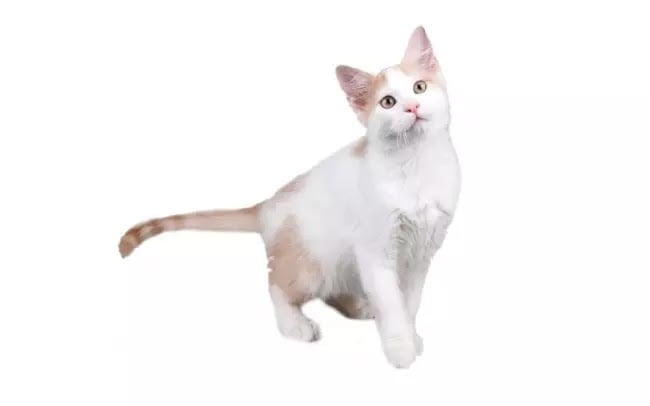The Japanese Bobtail cat is a friendly and sociable pet that is considered lucky in Japan. They have a soft voice and their coat can be long or short, in various colors and patterns. What makes them unique is their one-of-a-kind tail. Japanese Bobtails are social cats who like being the center of attention. They get along well with people and other pets, and they easily adjust to new surroundings. These cats are active and intelligent, often enjoying playing with water and toys. Their high-pitched vocalizations are often compared to singing.
History
The Japanese bobtail is an ancient cat breed that is believed to have originated in China or Korea over a thousand years ago. It is commonly found in Japan and has played a significant role in the country’s silk trade since the 1600s. There are different theories about how the breed came to Japan, with some suggesting it was a gift from the Emperor of China, while others believe it was brought by Buddhist monks to protect rice paper scrolls from rats. In 1602, the Japanese emperor released Japanese bobtails to deal with rodents that were threatening the silk trade. Due to a law, they became street cats rather than pets. The Japanese bobtail is often depicted in ancient artworks and is represented in popular Japanese figurines called the Beckoning Cat. It was introduced to the United States in the 1960s for its friendly personality and unique appearance. The short-haired version of the breed became a champion in 1978, followed by the long-haired version in 1993. Both variations are now officially recognized by the Cat Fanciers Association.

Size
The Japanese Bobtail is a medium-sized cat breed with a distinctive short and bobbed tail, consisting of one to three vertebrae that are flexible like an accordion. The breed’s size typically ranges from 7 to 10 pounds for females and 9 to 13 pounds for males, making them sturdy without appearing bulky. This versatile breed comes in various colors and patterns, including red, white, black, tortoiseshell, calico, tabby, bi-colors, and van-patterned coats. The most iconic coloration is the white coat with patches of any other color known as “Mi-Ke,” which is highly valued in Japan for its cultural significance. With proper care and nutrition, the Japanese Bobtail has a relatively long lifespan ranging between 12 to 16 years.
Personality
Japanese Bobtail cats are known for their distinctive personalities and are different from other breeds. They are intelligent and curious, and they enjoy being active and exploring their surroundings. They are playful and mischievous, often playing interactive games with their owners or toys. They are also friendly and social, making them great companions for families or individuals who enjoy having a cat around. They crave human interaction and will seek attention by following their owners or even sitting on their shoulders. Although they can be independent at times, they still appreciate having a human presence and can become lonely if left alone for long periods of time. Overall, Japanese Bobtails have a unique combination of playfulness, sociability, and independence that makes them charming pets.
Food
Japanese Bobtail cat breeds require no exceptional diet or feeding regiments. What they do require, nonetheless, is a quality cat food and an even diet. Letting one of the cat’s most prominent foes, corpulence, creep into the image through over-feeding or such a large number of treats is significant not.
Grooming
Grooming the Japanese Bobtail cat breed requires a careful and thorough approach to maintain their unique appearance. These cats have a special double coat that needs regular attention to prevent matting and tangles. Brushing with a stainless steel comb is important to remove loose hair and maintain the coat’s natural texture. Bathing should be done regularly using cat-specific shampoos to keep them clean and reduce shedding. Cleaning their ears with a mild ear cleaner and cotton swabs is necessary. Trimming their nails monthly is important because they have delicate paws. Lastly, daily brushing with feline toothpaste is essential for dental hygiene to prevent tartar buildup and keep their overall oral health in good shape.

Training
To effectively train Japanese Bobtail Cats, it’s important to establish a consistent routine. Start with basic commands like come, sit, stay, and lie down, using positive reinforcement techniques such as treats or praise. It’s also important to engage them in interactive play sessions to release their energy and keep them stimulated. Providing puzzle toys and scratching posts can prevent destructive behavior. Their intelligence allows them to learn tricks or even harness training if gradually introduced and positively reinforced. Patience is key, as these cats prefer calm environments without sudden changes. Overall, a professional approach to training can promote good behavior, mental development, and a strong bond with these cats.
Health
Japanese Bobtails are for the most part healthy cats with no significant health issues associated with their breed. As indicated by specialists, the Japanese Bobtail is perhaps the most hereditarily different family breed. Contrasted and different breeds, the Japanese Bobtail will in general have more modest litters with the kittens being bigger upon entering the world and developing at a quicker rate. Kitten death rates are supposed to be relatively low.
Bottom Line
The Bobtail is an incredible counterpart for families with kids since he shares their high energy level. He is okay with anything, from playing get to being a visitor at a casual get-together to being spruced up in doll garments and strutted around in a child buggy. Continuously administer children to ensure they pet and play with the cat pleasantly and don’t pull his ears or wind his tail. He is happy to live with cat-friendly canines, as well, on account of his pleasant and valiant demeanor. Present pets gradually and in controlled conditions to guarantee that they figure out how to get along together.
If you’re searching for an active, athletic cat for your home, the Japanese Bobtail cat might be exactly the thing you’re wanting to find. Try to completely vet any breeders prior to bringing a kitten home to guarantee you are not supporting deceitful breeding practices. If you’re fortunate, you’ll track down a breed-specific salvage close to you or a Japanese Bobtail in a shelter, hanging tight for you to bring it back home.








